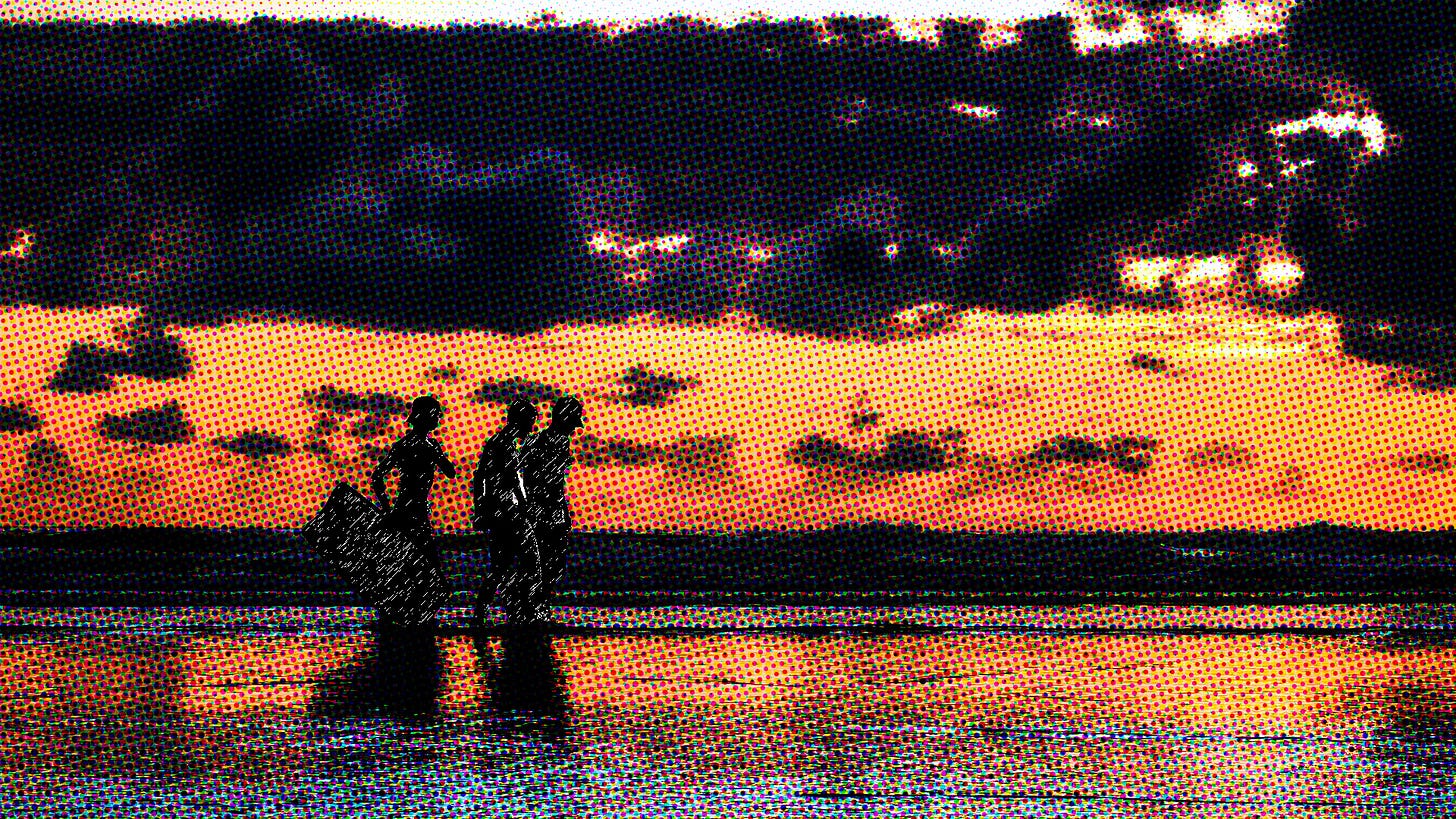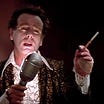Okay, so this is really about autumn.
I don’t remember whether the summer of 1984 was hot, but I know for sure that I didn’t like summer as a thing. It was sticky and it made me sneeze, and in my semi-rural world of zooming traffic and Keep Out signs, all roads were frustrating loops back home. Fruitless parental exhortations to ride a bike or kick a ball compounded a lurking self-awareness that I wasn’t doing summer properly like other kids, that I shouldn’t be just leaping from shadow to shadow and pulling the blinds down, like something hiding under a stone.
Along with comics and TV, pop music was my refuge. I listened indiscriminately, not yet knowing what I liked, to everything from The Thompson Twins to my sister’s Genesis cassettes (and late 1970s Genesis is sheer bloody hard work). 1984 was scored by an extraordinarily rich pop soundtrack: electronica, R&B, indie jangle, poodle-perm rock, hip hop, post-punk and slinky disco fought it out in the charts. Just that summer alone I wouldn’t let the sun go down on me, but jumped for my love and just called to say I love you while not doing white lines as, time after time, doves cried and the smalltown boy pushed pineapple and shook the tree. But what’s love got to do with it?
Whatever it was, I taped it off the radio on C90 after C90 just to get me through the interminable nothingness of the holidays. By September it was a relief to put a V-neck on and get back to school. But the autumn of 1984 wouldn’t let summer shrivel and die. As the leaves turned, the pop charts conjured up one more spectre of the season gone by and lodged in my head an image of something I was not.
The sheer ubiquity of Don Henley’s ‘Boys of Summer’ - its arty black and white video by Jean-Baptiste Mondino ensured repeated plays on TV - brought to my mind a roving pack of boys, older than me and able to drive, descending upon some sleepy American Stephen King-like town at the start of summer and taking it over, or at least taking over the beach. A bunch of tanned, good-looking boys, of a kind that didn’t exist in North Wales. Boys who could run, swim and catch, kick balls around and look nice with their tops off. Boys who girls would like: not just the distracted girl of the song, with her hair combed back and her sunglasses on, but even the girls I knew, with their bubblegum and their Howard Jones haircuts. (In my memory the song was so completely everywhere that I was astonished, on researching this piece, to see it only reached number 12 in the UK charts.)
Perhaps those Boys of Summer stick in my memory today because, encased in their MOR rock soundscape, they sort of gave me the creeps. Who were they, and what did they want? Or what had they wanted? Because they had gone, hadn’t they, in the timescape of the song? But perhaps not entirely, for the song imagines a kind of eternally repeated past which looks forward to a never-achieved point at which these legendary boys will have finally upped and gone. And because they never really go, or are never actually seen to depart, the ripple effect of their almost-absent selves reverberates through the logic and story of the song. Had they formed an actual past visitation which had distracted the singer’s past love away - the girl he can still see, down an avenue of remembered time, her brown skin shining in the sun, walking real slow and smiling at everyone? Or were they just some spectral example of the kind of boy the narrator was not and never could be? Somehow the creepiest thing about these boys was that they didn’t appear in the video.
And who was this fellow with the reedy high-pitched voice? He wasn’t a Boy of Summer himself, that’s for sure. Where did he conceal himself when the invisible boys were (or perhaps were not) around? Would they have kicked metaphorical sand in his face if he had realistically ventured out? He at least appears in the video, but in my mind’s eye he should have been a thin young man like me who kept out of the sun, hiding from the ghostly boys, watching - perhaps through a chink in the blinds - as his erstwhile and possibly also imaginary girlfriend found the boys more interesting and fun than him, before creeping back out again when the season turned: nobody on the roads, nobody on the beach. To me, this wan figure was absolutely not the middle-aged Don Henley, looking a bit unsure of himself in the video. The manifestation of that wistful voice didn’t make sense: Henley just looked like an old guy riding around in the back of a truck. It bothered me.
I had never heard of the Eagles, and knew nothing of the ‘Hotel California’. Why would I? I was 14. My first awareness of living, breathing contemporary music was the early singles of Madness. The return to the 1980s charts of various (to my eyes) old geezers such as Henley, Joe Cocker, Paul McCartney, George Harrison and the ubiquitous Elton John both baffled me and made me yawn. Their new music, with its synthesisers and snapping snare-drum effects, strove for the contemporary but seemed to originate from a time that predated me, and therefore didn’t involve me at all. Somehow, Don Henley wistfully singing about ghostly boys and brown girls felt like my uncle, but my uncle on ‘Top of the Pops’. And that didn’t seem right.
If I over-analysed things, what can I say? There was very little to do in Northop Hall in the mid-1980s. But as well as vindicating my belief that summer was a chimerical nothingness for others to pretend to enjoy, by earworming itself right through my head and out the other side ‘Boys of Summer’ at least helped me to make some choices about music, if only to decide that I really didn’t like the burnished but tinny sound of soft rock that permeated the airwaves and cop-show soundtracks of the 1980s.
By the winter of 1984, we weren’t sure if they knew it was Christmastime at all, and by the following summer I had finally put away those Genesis tapes, Bowied myself up a bit, and took my first peek through the John Peel portal into the inevitable indieverse where Morrissey lurked with his gladioli. There would be no room for Don Henley, Foreigner, Toto or the Speedwagon, or any of those middle-aged troubadours who seemed so uncool to me back then.
Fast forward 30-odd years and my fifty-bloody-one-year-old self looks on as many of these now elderly rock gods whoop up the applause of a new generation on the Glastonbury oldies stage. I happily whoop along as they enjoy their last hurrah. Much of the music that shaped my spotty self in the ’80s just sounds like noise now. But not ‘Boys of Summer’. As I play the ghostly video on YouTube for the umpteenth time, my foot begins to tap, my head begins to nod…
For more uncanny encounters with pop:






Great article James - perfectly captures that "I'll listen to anything" period when your ears are wide open and you haven't yet chosen your tribe.
Also, Northop Hall!! What I remember about Northop Hall is that it had a ford across the road, which always fascinated me, even though the A55 had long since bypassed it.
I grew up in Halkyn., but I was a dozen years ahead of you, so my "not sure why I like this" track was from an earlier Don.
Don McLean's American Pie. His high school sounded a lot more interesting than mine. Nobody was kicking off their shoes and dancing in the gym at Holywell High. Or if they did, they didn't invite me.
Here was another old guy, trading on nostalgia and lamenting 'the day the music died'.
Hang on just a minute, Don. You mean I'm only just discovering this stuff and I've already missed the best?
But, Boys of Summer is a classic. It's so much more than just another bland slice of AOR. It's a rock elegy to a dead romance, or maybe one that never was. And let's face it, where else could you find a guitar solo that sounds like seagulls?
The mid-80s was like Jurassic Park for rock dinosaurs, with David Hepworth as a sort of Richard Attenborough, exhibiting them in an insecure Q magazine to alarmed teenagers